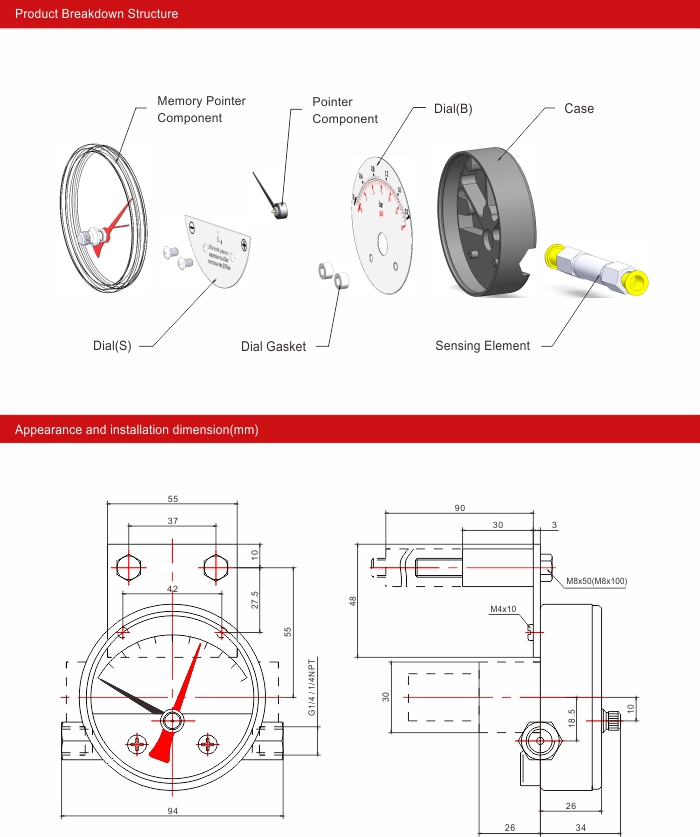
7 月 . 28, 2024 18:49 Back to list
Understanding the Role of Differential Pressure Gauges in Pharmaceutical Industry Applications and Benefits
The Role of Differential Pressure Gauges in the Pharmaceutical Industry
In the pharmaceutical industry, maintaining stringent quality and safety standards is of utmost importance. To achieve this, various tools and equipment are utilized, among which differential pressure gauges play a crucial role. These devices are essential for monitoring processes, ensuring product integrity, and maintaining compliance with regulatory standards.
A differential pressure gauge measures the pressure difference between two points in a system. In the context of the pharmaceutical industry, this can be particularly useful for monitoring processes such as filtration, cleanroom environments, and reactor systems. By providing continuous data on pressure variations, these gauges enable operators to make informed decisions and adjustments in real-time, thus ensuring optimal operational conditions.
One of the primary applications of differential pressure gauges in the pharmaceutical sector is in the monitoring of filtration systems. In the production of sterile pharmaceuticals, filters are used to remove contaminants from products and process streams. A differential pressure gauge can indicate the pressure drop across a filter, allowing operators to determine when a filter is becoming clogged or requires replacement. This monitoring not only ensures the efficiency of the filtration process but also protects the integrity of the final product, a critical consideration in pharmaceutical manufacturing.
Additionally, differential pressure gauges are vital in maintaining the conditions of cleanrooms, where pharmaceuticals are produced. Cleanrooms need to maintain a specific pressure relative to surrounding areas to prevent contamination. A properly functioning differential pressure gauge can alert personnel to any deviations from the desired pressure levels. This is crucial for ensuring that contaminants do not enter the cleanroom environment, ultimately safeguarding the quality of pharmaceutical products.
differential pressure gauge in pharma industry service

Moreover, these gauges are employed in containment systems to safeguard against cross-contamination. Certain pharmaceutical operations involve potent compounds that pose health risks to operators and patients alike. By installing differential pressure gauges at critical points, manufacturers can monitor the pressure differentials that prevent airborne particles from escaping containment areas. Such measures are not only vital for employee safety but also for public health, making them indispensable in the pharmaceutical industry.
In addition to their operational benefits, differential pressure gauges also play a significant role in regulatory compliance. The pharmaceutical industry is heavily regulated by agencies such as the FDA and EMA, which mandate strict adherence to Good Manufacturing Practices (GMP). Accurate and reliable measurement of pressure differentials is necessary to ensure compliance with these regulations. By utilizing advanced differential pressure gauges, companies can provide documented evidence that they are meeting the required standards, thereby reducing the risk of regulatory penalties and product recalls.
When selecting a differential pressure gauge for pharmaceutical applications, several factors must be considered, including the gauge's accuracy, range, and compatibility with the process fluids. It is also essential to choose gauges that can withstand harsh cleaning processes, such as sterilization and sanitization, to maintain their accuracy and functionality.
In conclusion, differential pressure gauges are indispensable tools in the pharmaceutical industry, providing essential data for monitoring filtration systems, cleanroom environments, and containment processes. By ensuring optimal operating conditions, these gauges help maintain product integrity and comply with regulatory standards. As the industry continues to evolve, the importance of precision measurement tools like differential pressure gauges will only grow, further enhancing the quality and safety of pharmaceutical products.
-
High-Precision 5 Valve Manifold Differential Pressure Gauge Suppliers
NewsApr.29,2025
-
High-Precision Diaphragm Vacuum Pressure Gauges Manufacturers & Quotes
NewsApr.29,2025
-
Omega Differential Pressure Gauges High Accuracy & Durability
NewsApr.28,2025
-
Low Pressure Differential Pressure Gauges Precision Solutions & Quotes
NewsApr.28,2025
-
Digital Diaphragm Pressure Gaauge Precision Measurement & OEM Quotes
NewsApr.28,2025
-
Differential Pressure Gauge China Price High-Accuracy & Best Quotes
NewsApr.28,2025
